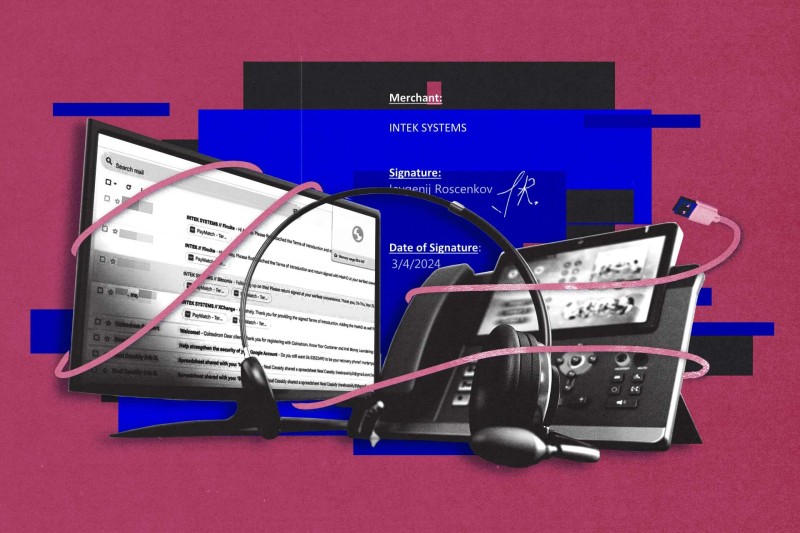Reported by
When journalists exposed a massive call center scam in the heart of the Georgian capital Tbilisi last month, it looked like the game was up for the scammers.
Employees of the call center hastily abandoned their downtown offices and scrambled to shut down their social media accounts, deleting posts flaunting high-end purchases and lavish vacations.
Soon after, Georgian prosecutors launched a criminal probe into the company behind the operation, A.K. Group, for alleged fraud and money laundering. Authorities froze assets belonging to the head of the call center, Akaki Kevkhishvili, and five other scammers exposed by OCCRP.
But despite all this, the Georgian scammers appear to be back at work.
According to new internal records obtained by Swedish digital forensic group Qurium, 14 of the call center’s agents were active on their Voice-over-IP (VoIP) provider Squaretalk late on March 25, placing at least 184 outgoing calls. VoIP technology allows users to make large numbers of internet-based phone calls while disguising their country of origin.
The newly obtained records suggest the scammers restarted their operations just weeks after being exposed by OCCRP, Swedish Television (SVT), and 30 other media partners in a collaborative investigation known as Scam Empire, which was published on March 5.
One of the A.K. Group's offices in Tbilisi, Georgia.
The findings demonstrate the ease with which sophisticated scam operations are able to continue working, even after being exposed by investigative journalists or disrupted by law enforcement.
OCCRP and partners reported in the Scam Empire investigation that the Tbilisi call center employed approximately 85 scammers and support staff, generating $35.3 million from more than 6,100 victims worldwide between May 2022 and February 2025.
Giorgi Davituri, a legal expert at the Tbilisi-based Institute for Development of Freedom of Information, said scam call centers had been operating with impunity in Georgia for years, because of a lack of political will to seriously investigate and root them out.
“The fact that these agents are still active wouldn’t surprise me,” he said.
Baia Tsanava, a spokesperson for Georgia’s Prosecutor’s Office — which announced it had launched an investigation into A.K. Group on March 7 — told OCCRP the probe was ongoing and that “relevant investigative and procedural actions” were being taken.
Georgian authorities are working with “foreign counterparts” to identify alleged victims and perpetrators of the scam, Tsanava added.
Kevkhishvili, the head of the call center, did not respond to a request for comment.
Scammers Rely on VoIP Services
Squaretalk, which says it is headquartered in the EU and Israel, was frequently used by A.K. Group to place outgoing calls. The call center recorded paying at least $150,000 to Squaretalk between August 2023 and March 2025, according to internal financial records.
Dimitar Boradjiev, a lawyer for Squaretalk, said the company was “fully committed to the responsible use of its communication platform” and had been “engaged in active cooperation with law enforcement authorities in multiple jurisdictions since January 2025, in relation to the accounts” used by the scammers.
This included complying with “court orders requesting specific data” and “confidential police inquiries,” he said, adding that Squaretalk could not publicly disclose further details for legal reasons. He said the company had not been aware of an investigation against the scammers in Georgia.
Squaretalk had been officially instructed to “not disconnect the requested account [or] phone numbers . . . so as not to jeopardize the investigation,” Boradjiev said.
Scammers Used U.K.-Registered Company to Pay Squaretalk, Other Suppliers
However, when asked about Intek Systems, the U.K. company through which A.K. Group was paying Squaretalk, the company lawyer said it had not been aware of this, and would suspend the account.
“[W]e appreciate your note regarding the payment from Intek Systems Limited, despite the company’s dissolution in January,” Boradjiev said. “Based on this valid information, along with findings from our internal compliance review, we will be taking appropriate action. The account will be formally suspended by the end of this week, unless updated KYC documentation and proof of valid company registration are provided in the interim.”
Cybercrime expert Keven Hendricks told OCCRP that VoIP services were critical to the business model of scam call centers. He said VoIP providers had a responsibility to “self-police” to make sure their services were not being used by scammers.
Once those VoIP providers have distanced themselves or ceased services to these scam centers, it makes it incredibly hard for them to communicate [with victims],” Hendricks said.
'Disruption is the Win' in Scam Operations
The newly obtained records from Squaretalk revealed that 14 A.K. Group employees had made calls on March 25. One of them, “Luke Wade,” was previously linked by reporters to a real person: Zviad Urushadze, an employee who worked in the Georgian call center’s IT department and helped administer A.K. Group’s Squaretalk accounts. Urushadze’s work Telegram account has also been active in recent days.
Despite his support role, Urushadze seems to have been well aware of the call center’s dubious activities. “Does he [a visitor to the office] know that we are scammers?”, he asked in a Telegram conversation with a colleague.
Urushadze did not respond to requests for comment.
Other A.K. Group employees using Squaretalk in late March were members of the English-language “retention” desk, which OCCRP’s investigation found generated the bulk of the call center’s income.
Mirroring the structure of legitimate sales operations, A.K. Group has divided its agents into “conversion” and “retention” teams. While the “conversion” team is tasked with turning ad-generated leads into clients, the more experienced “retention” agents focus on extracting as much money as possible from each victim.
A screenshot from the computer of an A.K. Group agent, showing her logging into her newly created Squaretalk account.
Despite the increasing proliferation of scam operations globally, many authorities still don’t take them seriously enough, according to Keven Hendricks, the cybercrime expert.
He told OCCRP that a widespread perception of scams as mere “nuisances” has led to “complacency” among international law enforcement.
"When we think of fraud and people being scammed, we almost think of it in terms of, there's nothing that we can do to get their money back,” he said. “And that's not just law enforcement."
But he added that disrupting scammers’ operations — by shutting down their accounts, for example — was often more effective than pursuing them through the courts.
“[There are] two ends of the spectrum, either disruption or prosecution, and more often than not disruption is the win because you’ve been able to disrupt these criminal activities. You’ve been able to shut down sites, you’ve been able to flag accounts,” he said.









